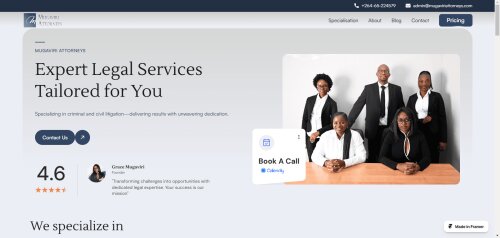Best Lawyers in Namibia
Share your needs with us, get contacted by law firms.
Free. Takes 2 min.
Or refine your search by selecting a city:
List of the best lawyers in Namibia
Namibia Legal Questions answered by Lawyers
Browse our 1 legal question in Namibia and read the lawyer answers, or ask your own questions for free.
- Late father's house..
- Is a long but will try to make it short, I stayed with my dad and some siblings at his house, when we finished school, my two brothers back to his mum, other one went to UK and my step sister,, I dnt know where she moved, so me stayed... Read more →
-
Lawyer answer by mohammad mehdi ghanbari
HelloBased on the details you've provided, you are in a difficult and emotionally trying situation. Here is some information that may help you understand your legal position.Dying Without a WillWhen a person passes away without a valid will, it is...
Read full answer
About Hiring a Lawyer in Namibia
In Namibia, hiring a lawyer begins by identifying the type of legal assistance you need, as lawyers may specialize in specific areas like family law, corporate law, or criminal defense. You can start your search by consulting the Law Society of Namibia's website, which provides a list of registered legal practitioners. Once you've shortlisted potential lawyers, arrange consultations to discuss your case, their experience, and their fee structure. It's important to ensure that the lawyer you choose is registered with the Law Society to avoid dealing with unqualified practitioners.
Why You May Need a Lawyer
There are several scenarios where you might need legal assistance in Namibia. These include but are not limited to:
- Personal legal issues such as divorce, child custody, or drafting a will.
- Business matters including setting up a company, contracts, or intellectual property rights.
- Criminal defense if you are accused of a crime.
- Land disputes or real estate transactions.
- Understanding local labor laws for employment-related issues.
In these instances, a lawyer can provide valuable guidance and representation to protect your rights and interests.
Local Laws Overview
Namibia's legal system is based on a combination of civil law, customary law, and common law, inherited from its colonial past. Key legal considerations include:
- Constitutional Law: Namibia's Constitution is the supreme law, protecting fundamental human rights and freedoms.
- Property and Land Law: Property rights are strongly protected, but land reform and redistribution are ongoing topics.
- Labor Law: Comprehensive regulations govern employer and employee relationships, including working conditions and disputes.
- Commercial Law: Legal provisions cover business operations, including formation, taxation, and trade practices.
Understanding these laws can be crucial, especially for businesses and rights-based issues.
Frequently Asked Questions
1. How do I verify if a lawyer is registered in Namibia?
Check with the Law Society of Namibia, which provides an official list of registered legal practitioners.
2. What should I prepare before my first meeting with a lawyer?
Bring all relevant documents related to your legal issue, a list of questions, and a clear outline of what you wish to achieve.
3. Can I represent myself in court?
Yes, you can represent yourself, but having a lawyer is advisable, especially for complex legal matters.
4. What are typical lawyer fees in Namibia?
Fees vary based on the lawyer's experience, the complexity of the case, and whether it's a fixed fee or hourly rate. Always clarify fees upfront.
5. How long does a legal case typically take?
The duration depends on case complexity and the court's schedule. Simple cases may resolve quickly, while others may take longer.
6. Is free legal advice available in Namibia?
Yes, organizations like the Legal Assistance Centre offer free legal aid to those who cannot afford it.
7. What should I do if someone files a lawsuit against me?
Seek legal advice immediately to understand your rights and formulate a defense strategy.
8. What are customary laws in Namibia?
Customary laws are traditional laws that govern personal and communal relationships, often based on ethnic and cultural practices.
9. Can I change my lawyer if I am not satisfied?
Yes, you can change your lawyer at any stage, but review any contractual obligations first.
10. Are there special considerations for foreign businesses operating in Namibia?
Yes, foreign businesses must comply with specific regulations, such as obtaining appropriate licenses and adhering to local investment laws.
Additional Resources
For further legal assistance, consider reaching out to:
- The Law Society of Namibia: Offers resources and a lawyer directory.
- Legal Assistance Centre: Provides legal aid and advocacy for public interest cases.
- Namibian Ministry of Justice: Offers legal education and resources.
Next Steps
If you need legal assistance in Namibia, the first step is to clearly outline your legal needs. You can then research potential lawyers or reach out to legal aid organizations if budget is a concern. Schedule consultations to discuss your case and determine the best legal representation for you. It's crucial to act promptly and ensure that your lawyer is well-informed about your situation to ensure the best possible outcomes.
Lawzana helps you find the best lawyers and law firms in Namibia through a curated and pre-screened list of qualified legal professionals. Our platform offers rankings and detailed profiles of attorneys and law firms, allowing you to compare based on practice areas, experience, and client feedback.
Each profile includes a description of the firm's areas of practice, client reviews, team members and partners, year of establishment, spoken languages, office locations, contact information, social media presence, and any published articles or resources. Most firms on our platform speak English and are experienced in both local and international legal matters.
Get a quote from top-rated law firms in Namibia — quickly, securely, and without unnecessary hassle.
Disclaimer:
The information provided on this page is for general informational purposes only and does not constitute legal advice. While we strive to ensure the accuracy and relevance of the content, legal information may change over time, and interpretations of the law can vary. You should always consult with a qualified legal professional for advice specific to your situation.
We disclaim all liability for actions taken or not taken based on the content of this page. If you believe any information is incorrect or outdated, please contact us, and we will review and update it where appropriate.
Refine your search by selecting a practice area.
Accidents & Injuries
Banking & Finance
Bankruptcy & Debt
Business
Civil & Human Rights
Consumer Rights
Corporate & Commercial
Criminal Defense
Employment & Labor
Energy, Environment & ESG
Family
Immigration
Insurance
Intellectual Property
Lawsuits & Disputes
Media, Technology and Telecoms
Notary Services
Private Client
Real Estate
Browse law firms by city in Namibia
Refine your search by selecting a city.



































